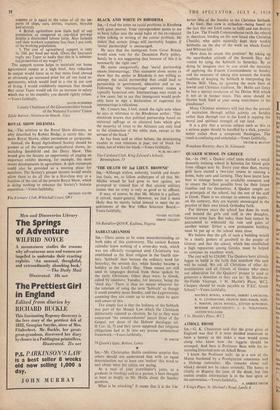BLACK AND WHITE IN RHODESIA
SIR,—I read the letter on racial problems in Rhodesia with great interest. Your correspondent seems to me to have fallen into the usual habit of the ex-colonial when talking or writing of the colour problem. He insists that certain things will inevitably happen if 'social partnership' is encouraged.
He says that the immigrant from Great Britain would soon vote for the Dominion Party policy. Surely he is not suggesting that because of this it is necessarily the right one?
He states categorically that 'social partnership means intermarriage.' This statement alone seems to show that the settler in Rhodesia is not willing to attempt the social partnership that could lead to partnership in government, education and so on. Following the 'intermarriage' sentence comes a typically hysterical one. Intermarriage may result in a few cases, but to say that immigrants would prob- ably have to sign a declaration of eagerness for intermarriage is ridiculous.
Mr. Consett has, I feel, struck the right note when he says in reference to the Rhodesian settler : 'This electorate knows that political partnership based on universal suffrage or on electoral laws which give the majority of votes to the Africans can only lead to the elimination of the white man, except as the servant of the black.'
As has been said so often before, the dominating trouble in race relations is fear; not of black for white, but of white for black.—Yours faithfully,
N. M. MCCARTY
The Gartland Club, King Edward's School, Birmingham, 15






















































 Previous page
Previous page